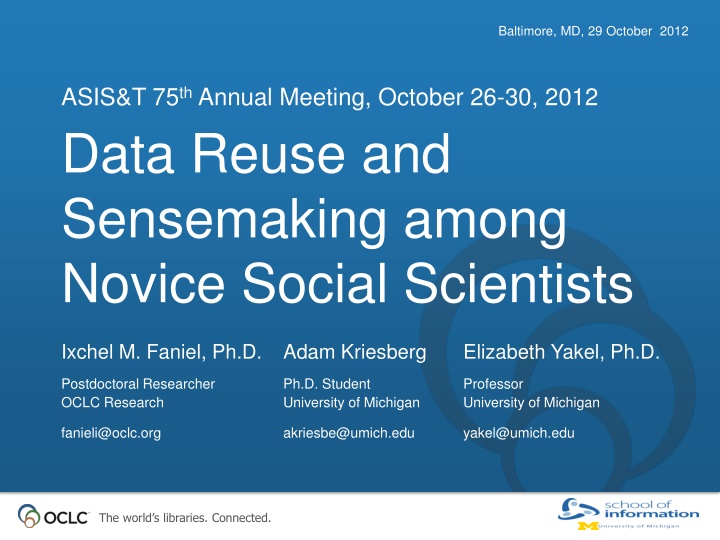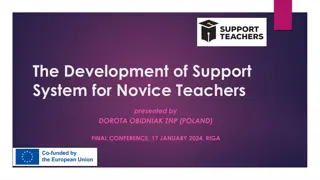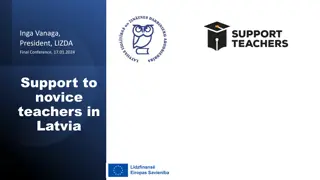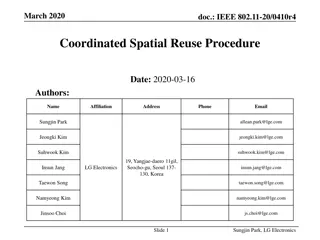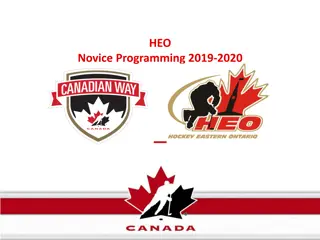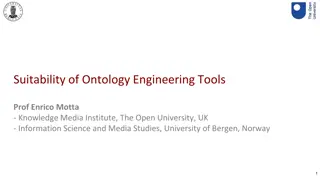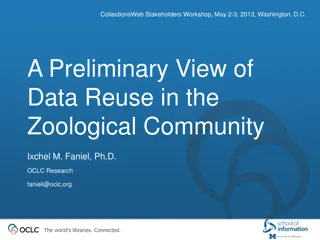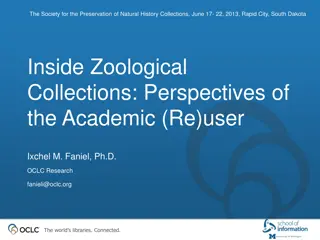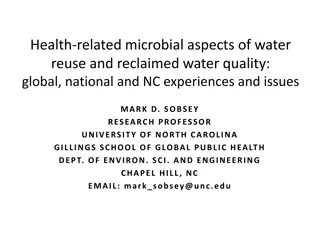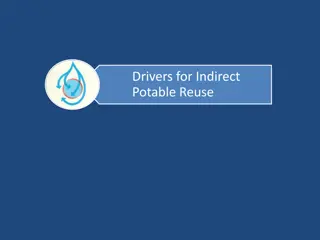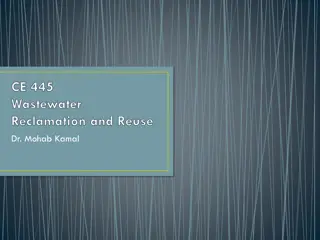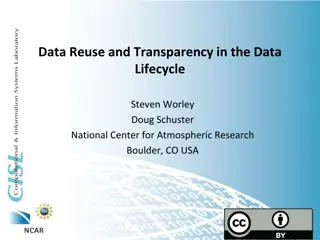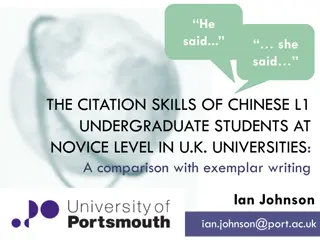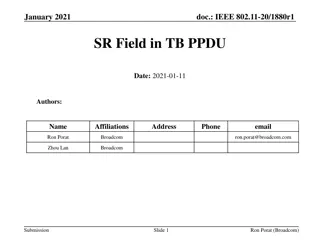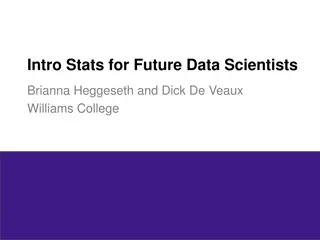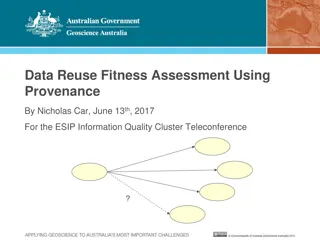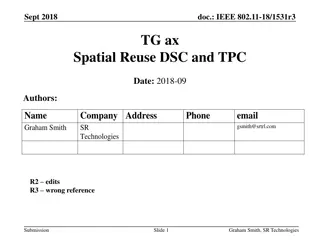Data Reuse and Sensemaking among Novice Social Scientists
An IMLS-funded project led by Dr. Ixchel Faniel and Dr. Elizabeth Yakel studying data reuse in academic disciplines and how contextual information can support reuse. Focuses on data used by social scientists, archaeologists, and zoologists and targets researchers and digital curators. Explore findings on how novice social science researchers make sense of data and transformations from qualitative to quantitative data.
Download Presentation

Please find below an Image/Link to download the presentation.
The content on the website is provided AS IS for your information and personal use only. It may not be sold, licensed, or shared on other websites without obtaining consent from the author.If you encounter any issues during the download, it is possible that the publisher has removed the file from their server.
You are allowed to download the files provided on this website for personal or commercial use, subject to the condition that they are used lawfully. All files are the property of their respective owners.
The content on the website is provided AS IS for your information and personal use only. It may not be sold, licensed, or shared on other websites without obtaining consent from the author.
E N D
Presentation Transcript
Baltimore, MD, 29 October 2012 ASIS&T 75thAnnual Meeting, October 26-30, 2012 Data Reuse and Sensemaking among Novice Social Scientists Ixchel M. Faniel, Ph.D. Adam Kriesberg Elizabeth Yakel, Ph.D. Postdoctoral Researcher OCLC Research Ph.D. Student University of Michigan Professor University of Michigan fanieli@oclc.org akriesbe@umich.edu yakel@umich.edu The world s libraries. Connected.
An IMLS-funded project led by Dr. Ixchel Faniel and Dr. Elizabeth Yakel. Studying data reuse in three academic disciplines to identify how contextual information about the data that supports reuse can best be created and preserved. Focuses on research data produced and used by quantitative social scientists, archaeologists, and zoologists. The intended audiences of this project are researchers who use secondary data and the digital curators, digital repository managers, data center staff, and others who collect, manage, and store digital information. For more information, please visit http://www.dipir.org The world s libraries. Connected.
The Study Research Question How do novice social science researchers make sense of social science data? Data Collection 22 Interviews Data Analysis Code set developed and expanded from interview protocol http://www.english.sxu.edu The world s libraries. Connected.
Findings it's numerical value on things that don't have numerical value. So it's not like a sort of thing is worth a certain amount, that numerical value is something that everybody can understand (CBU14). Faniel, Kriesberg & Yakel 2012 The world s libraries. Connected.
Making sense of transformations from qualitative to quantitative data Direct maps (e.g. White=0, Black=1, Asian=2, etc.) not enough I want to find out when they ask the question to the parent or to the student, how was that question asked and was there follow-up questions in terms of did they ask what is your race as opposed to allowing the parent or the student to tell them what their race was (CBU10). Interested in how direct maps developed So they use New York Times continuously for like the 30 years. New York Times, it has changed. So I want to know like what years New York Times was used to gather data. I'm sure they used more than one newspaper. Also, I want to know which ones those were, for example (CBU03). The world s libraries. Connected.
Making sense of concepts not well-established in the literature Do beliefs match data producer actions Andthat s not to exclude it just by the nature of it being a right wing organization, but I would want to evaluate their methods to see if that s the methods that I would ve chosen (CBU09). How will reusing data impact research some parties, had only like one or two experts rating them, in the Dutch case, which makes it not super reliable, so that s what s kind of like [it made me think, ] Oh I should really pay attention that that s not going to hurt me (CBU17). The world s libraries. Connected.
Making sense of matching and merging capabilities across multiple datasets Combining longitudinal data If they're not asking the same question over years, [it s] particularly difficult because if they ve changed the question wording, are then people answering differently and so there were several discussions that I had with my dissertation advisor (CBU18). Merging data from different sources authors will create a variable, they ll average across a four or five year period, and I m trying to match that with a variable that was coded for a single year period. So making an argument that these two things should be put together , is something I always have to be wary of So when dealing with that, I ll see if it s been done by others (CBU04). The world s libraries. Connected.
Discussion Novices engaged in careful articulation of the data producer s research process. The world s libraries. Connected.
Discussion Novices relied on human scaffolding in the form of faculty advisors and instructors. http://www.lemoyne.edu The world s libraries. Connected.
Discussion Human scaffolding also came from the community as represented in the literature. http://www.texasenterprise.utexas.edu The world s libraries. Connected.
Next Steps Social scientists Archaeologists Zoologists Interviews ICPSR Data Reusers Survey Map significant properties of data as representation information UMMZ Data Reusers Observations Faniel & Yakel 2011 OpenContext.org transaction log analysis Web analytics The world s libraries. Connected.
Acknowledgements Institute of Museum and Library Services Co-PI: Elizabeth Yakel, Ph.D. Partners: Nancy McGovern, Ph.D. (MIT), Eric Kansa, Ph.D. (Open Context), William Fink, Ph.D. (University of Michigan Museum of Zoology) Students: Morgan Daniels, Rebecca Frank, Julianna Barrera- Gomez, Adam Kriesberg, Jessica Schaengold, Gavin Strassel, Michele DeLia, Kathleen Fear, Mallory Hood, Molly Haig, Annelise Doll, Monique Lowe The world s libraries. Connected.
Ixchel M. Faniel fanieli@oclc.org Questions? The world s libraries. Connected.
